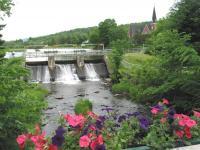 About 100 kilometres southeast of Montreal, on the shores of a magnificent five-kilometre wide lake, Knowlton is at once a blooming, shady and festive village, especially during the summer and weekends. Vacationers gather here to enjoy aquatic activities on the lake, the beauty of the surrounding landscapes, and the quaint charm of the streets, which are lined with specialized boutiques, antique shops, and cafés.
About 100 kilometres southeast of Montreal, on the shores of a magnificent five-kilometre wide lake, Knowlton is at once a blooming, shady and festive village, especially during the summer and weekends. Vacationers gather here to enjoy aquatic activities on the lake, the beauty of the surrounding landscapes, and the quaint charm of the streets, which are lined with specialized boutiques, antique shops, and cafés.
The village was founded in 1821 with the construction of the first mill, a flour mill built in 1836 by Colonel Knowlton. A sawmill and the general store then followed. In the second half of the nineteenth century, Knowlton became the administrative, legal and postal centre of the region.
As is typical of the region, the presence of three different churches (one Catholic, one Anglican and one 1875 Victorian-style Methodist) epitomizes the co-existence of different cultures and religions. Beautiful residences spread across the village, particularly in the wooded area near the north entrance. Visit Masonic Hall (61, chemin Lakeside), which dates back to 1843 and once housed a tannery. A scenic little pond drawn from Cold Brook Creek decorates the village centre.
A number of interesting public buildings are worth visiting, notably the P.H Knowlton Memorial (1854, now the Brome County Museum), the former post office (1904, now city hall), the former Eastern Township bank, and the old library of 1894.
Duck farming is a Lake Brome specialty. Purchase or sample the variety of duck products available. For your intellectual cravings, a summer theatre features performances in English.
The Anglo-Saxon charm of Knowlton makes a winter visit worthwhile, too. Enjoy the inns, winter ice-fishing, window shopping, and winter sports at Mount Glen. For a rejuvenating visit, try the lakefront health spa.